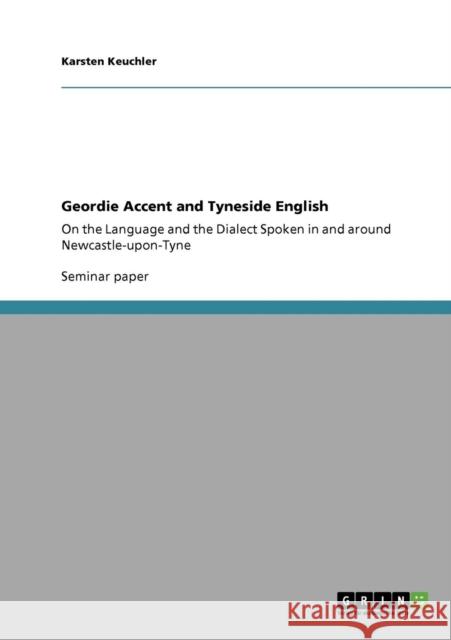Geordie Accent and Tyneside English: On the Language and the Dialect Spoken in and around Newcastle-upon-Tyne » książka
Geordie Accent and Tyneside English: On the Language and the Dialect Spoken in and around Newcastle-upon-Tyne
ISBN-13: 9783640742738 / Angielski / Miękka / 2010 / 56 str.
Geordie Accent and Tyneside English: On the Language and the Dialect Spoken in and around Newcastle-upon-Tyne
ISBN-13: 9783640742738 / Angielski / Miękka / 2010 / 56 str.
(netto: 144,06 VAT: 5%)
Najniższa cena z 30 dni: 150,84
ok. 16-18 dni roboczych
Dostawa w 2026 r.
Darmowa dostawa!
Seminar paper from the year 2007 in the subject English Language and Literature Studies - Linguistics, grade: 1,7, University of Dortmund (Anglistik/Amerikanistik), course: Northern English, language: English, abstract: What is a Geordie? Where does a Geordie live? And how does a Geordie speak and write? There have been countless debates about the definition of the term 'Geordie'. Oftentimes it has been applied to people all across the Northeast of England. In contrast to this, recent studies consider the term rather inappropriate for people living elsewhere than in Newcastle and its direct surroundings, i.e. the so-called Tyneside. Wells claims the term is to be applied to "anyone who comes from Tyneside" (Wells 1982: p. 374). However, there is hardly any evidence for either theory. The name 'Geordie' is obviously derived from the early 18th century, when the inhabitants of Newcastle supported the English kings George I and George II. Thus they had formed an opposition to Northumberland, where it was obligatory to support the Scottish Jacobite rebellions (cf. Smith 2007). What can be said without a doubt is that people living in Sunderland, not more than twenty miles south of Newcastle, would probably feel offended when being called a Geordie. They prefer the term 'Mackem' in spite of quite a number of similarities to the Geordies with regard to language. According to Andrea Simmelbauer, Tyneside English, spoken in and around Newcastle, is a dialect which is "restricted to an area which stretches some 10-12 kilometres to the north and to the south of the river Tyne"(Simmelbauer 2000: p. 27). Nonetheless, the task of a final definition of the term 'Geordie' remains and will probably remain unsolved. So what can this paper do? At least it can give an overview of the linguistic features which characterize the accent that is commonly used in Newcastle and its surroundings. This topic has been covered by a wide range of linguists not only in academic papers, but also in











